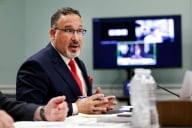You have /5 articles left.
Sign up for a free account or log in.
Last week my husband’s PhD advisor, Karel Liem, died after a short battle with pancreatic cancer. His death reminds me of what a central figure a graduate advisor can be. Starting as soon as he was diagnosed, emails, phone calls, blog entries and photos circulated as his academic family swirls in support, consolation and remembrance of him. A website has started to collect together all sorts of mementos about Karel, which will certainly include antics such as the nose-leech (!) he picked up in the innocent act of smelling a flower during fieldwork in Indonesia; the rivalry he set up between the vertebrate and invertebrate researchers at his summer field station, where he hoisted a fish flag up the flagpole to assert his ; how the teaching assistants once hijacked his lecture and kidnapped him, laughing uproariously, from the lecture hall to the amazement and delight of the 300 watching undergraduates; how Karel’s office filled with beeping for months after an (unknown?) prankster hid an alarm to go off at 4:15 every day, and how he stoically refused to acknowledge the perpetrator’s disruption even after the alarm finally ran out of battery.
Karel had a huge impact on his students. He engaged with them on a personal level, with much cheer, appreciation of the unusual (and the outrageous!) and some conspiratorial mischief. Many pictures now being shared of Karel over the years show him in a very recognizable, characteristic posture: doubled over from laughing – this despite (perhaps more than) his share of hardship and difficult situations. His lab was known for frequent parties with large quantities of delicious food and on many a Friday evening you could find a crowd of graduate students hanging out in the common room until late in the evening. Karel enjoyed fun, telling stories, interacting with people through his lab and university, and teaching with gusto – he swept people up and inspired them with his infectious enthusiasm. People wanted to be around Karel.
Karel’s death reminded me of another inspiring academic who died of pancreatic cancer just last year: Randy Pausch, professor of computer science. After his cancer diagnosis, Pausch gave a “last lecture” on his life, career, and family philosophies: a moving, upbeat, inspirational talk from an academic’s big-picture perspective, which I highly recommend, if you haven’t seen it before (it has widely circulated on the web and through the mainstream media, and been written as a book, too). In many ways I think Karel and Pausch shared similar outlooks, among them: have fun, work hard, find and share your passions, enable others.
Academia is a unique profession in that it depends on a central structure of advisors to teach, inspire, guide – a role similar to that of a parent. Of course there is a huge range of ways and effectiveness of mentoring in academia (just as there are in parenting), and there are many conflicts of interest. It’s lovely to see cases where enthusiastic, positive mentoring touches not only the advisor’s immediate students, but blossoms laterally and inclusively to others. I’m saddened by Karel’s passing. I’m happy to be included as an “in-law” to his large, loyal academic family lineage, a legacy that appreciates and will pass on his contributions not just to his field, but to the joyful process of learning and inspiring in general.





